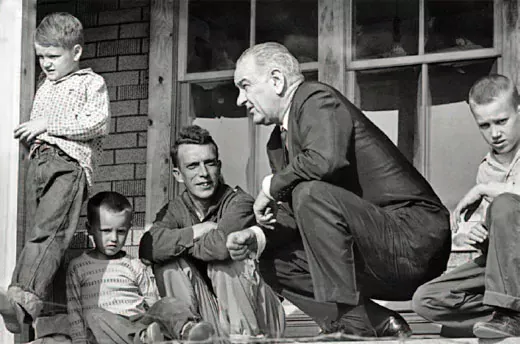The Other America

The Other America by Michael Harrington, which was originally published in 1962, became a widely read armament in what would eventually become known as the “War on Poverty.” Harrington argued that people fail and fall into a vicious cycle of poverty by being born to the wrong people in the wrong place and time. Ironically, Harrington succeeded by writing a book about right people in the right place and time. He was so right that a book of sociology, which was expected to sell a few thousand copies at most, went on to sell a million.
The Other America propelled Michael Harrington into a national spotlight as “the man who discovered poverty.” He rose to the point where eventually he was invited to Washington to coordinate the conduct of the “War on Poverty” commanded by President Lyndon Johnson.
Michael Harrington traveled a circuitous route through the Long 1960s. In addition to being known as “the man who discovered poverty” I would consider nominating him as “the Forest Gump of economic justice” due to his perambulations in and out of so many social and economic movements.
He grew up Catholic, in comfortable surroundings and was well educated at Yale Law School and the University of Chicago. Harrington was initially politically conservative, but during his University years he became involved with the Catholic Workers movement and the organized labor movement. He lived among the abjectly poor in shelters. He wanted to improve their lot, but eventually decided that these movements were ineffectual.
So Michael Harrington next was incarnated as a Trotskyist, meaning an anti-Stalinist anti-Soviet Union socialist. He would eventually serve as the president of the Socialist Party of America.
But first, he became engaged with the Civil Rights movement and travelled to the South to participate in sit-ins with Bayard Rustin and Martin Luther King, Jr.
Harrington also became interested in the issue of poverty, especially hidden and unrecognized poverty amongst seeming plenty. He wrote several articles about the subject of hidden poverty in Commentary magazine, then a liberal publication. These led to the publication of his book The Other America and unimagined success.
Harrington maintained that postwar America perpetuated a false narrative that the country offered peace and prosperity to all its citizens, complete with a rising standard of living for all. In fact, he attempted to show that 40 to 50 million Americans were living out of sight and out of mind in deeply impoverished circumstances with little or no hope of escaping from poverty. They were hidden from sight in urban ghettos and rural backwaters. He explained that even though these unseen victims were perhaps not as bad off as those starving in third world countries, their inability to obtain what most Americans would consider even the barest minimal living standards was an outrage that must be remedied.
It is said that President John F. Kennedy saw The Other America and was deeply affected by it. After Kennedy’s death, President Lyndon Johnson proposed a “War on Poverty” and recruited Michael Harrington to come to Washington as a consultant. He worked in this position for only one month. Harrington is credited with being instrumental in the creation of Medicaid, Head Start, and other social welfare programs which made up “The Great Society.”
Eventually, however, Harrington moved away from the ideal of a capitalist social welfare state just as he had rejected the Catholic Workers movement. Instead he pushed for a full socialist government. Harrington equally rejected violent revolutionaries like the Weather Underground, and ended up founding an organization of his own called “Democratic Socialists of America.”
Michael Harrington’s odyssey through the Long 1960’s mirrors in some ways the movements of the country as a whole from the insular comfortable content of Levittown to the recognition of racism and civil rights to the discovery of pervasive poverty and income inequality to the “New Left” and its eventual devolution into violence and finally the dogged pursuit of a utopian socialist ideal that somehow never arrives.